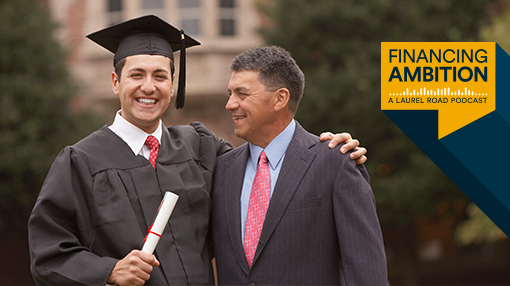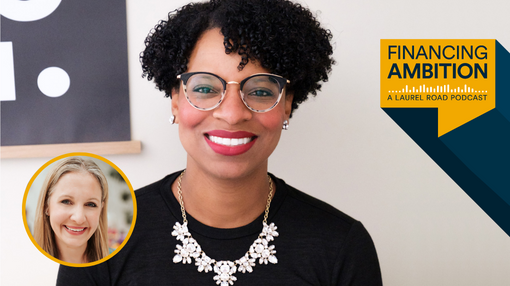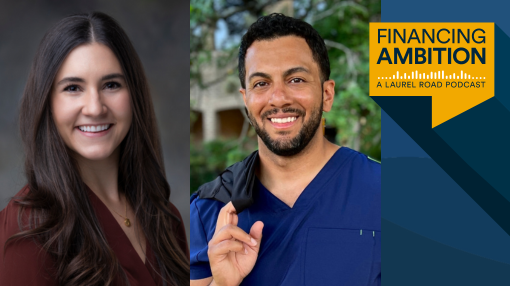Season 1, Episode 1
Listen to a conversation about American higher ed, its staggering rise in cost, cultural and generational differences in paying for and choosing an education. #millennialwoes
Transcript
Alex [00:00:07] Hey, this is Alex.
Briarley [00:00:09] And I’m Briarley. And you’re listening to Financing Ambition,SM a Laurel Road podcast.
Alex [00:00:17] So today’s episode centers around American higher education, paying for that education. The cultural and generational differences that influence our experiences. And we’ll have the chance to speak with a baby boomer himself.
Briarley [00:00:29] Okay. Alex, I’m hearing the word boomer a lot these days and often not in the best way. So tell us, what is a boomer?
Alex [00:00:37] So boomers were born between 1946 and 1964, post-World War 2, we actually did a survey recently targeting boomers and their millennial children. And what it showed was that the millennial children feel a lot of gratitude towards their boomer parents around paying for their education. I’m one of those kids. But before we get into that, Briarley, as our resident Kiwi who immigrated here, in what year is that? 2016? What are your experiences in higher education? And also besides being a sweetly delicious fruit, what is a kiwi in human form?
Briarley [00:01:10] OK. So despite what you think, it is not named after a fruit. The name actually derives from a bird. So for our listeners who don’t know what a kiwi looks like, Kiwis are smallish, flightless birds with really long legs and a really long beak — really cute. But as someone that’s really always been drawn to America, my first opportunity to really immerse myself into the culture was a study abroad program that I did at Texas A&M.
Alex [00:01:42] You didn’t retain the accent at all. What a shame. So how many universities are there in New Zealand and how do you choose which to attend?
Briarley [00:01:51] So it’s a lot simpler in New Zealand. We have about five main universities. Each one specializes in their own degree. So, for example, you’d go to a Targo university to do a medical degree or you’d go to Victoria University, which is actually where I went, if you want a law degree. I do not have a law degree, but I did decide to go there because it was quite local. For me, it really just depends on what the career path you want to take.
Alex [00:02:20] So in America they encourage a broad liberal arts education as sort of the starting path for figuring out what you want to do with your life. I lived in Europe for a little while and a lot of my friends there had to make a choice earlier on than Americans often have to, between trade school or university. I’m just wondering if you as a New Zealander also felt that.
Briarley [00:02:40] Yeah. So there are definitely a couple of different options that you can take out of high school and New Zealand. One of them is to go to university and another, like you say, is to do a trade and the other is to do your big OE, which is Kiwi lingo for doing your overseas experience. Kiwis pack up their bags and they venture off for a year or more, mostly going to the UK and Europe or Australia. So very different for sure.
Alex [00:03:07] And I know you and I have chatted about this, but it’s just interesting to consider like a profession such as a plumber, for example, can make a great living and that’s a trade school profession. And that is something that really is sort of underemphasized in this country.
Briarley [00:03:21] I totally agree. I think higher education isn’t favoring trades, and trades can be a really strong route. My mum and dad always pushed for me to go to college, but it was never really a requirement, and if I did want to go, then it was my choice and I actually had to foot the bill.
Alex [00:03:38] That’s really interesting because recently we polled 500 baby boomer parents to help the child pay for college and five hundred students whose parents helped them pay for college. And we came across a lot of interesting insights about the gratitude and the empathy that both parents and their children have for each other.
Briarley [00:03:57] Alex, wouldn’t it be great to talk to hear a baby boomer themselves just to kind of get their perspective?
Alex [00:04:02] That’s a great idea. Why do we try to get my dad on the phone?
William [00:04:15] Yeah, I’m here.
Alex [00:04:15] Hi, Dad. Welcome to the podcast. We’re speaking with William B, Lawrence, the third. He’s a senior vise president at a major financial services institution in Boston, Massachusetts.
William [00:04:26] Thank you, Alex.
Alex [00:04:26] You have the distinct honor of being our very first guest. Can you tell us a bit about your career background and why and how you got into financial services?
William [00:04:36] I had gotten a job right out of college. I knew somebody who helped me get a job in a field that was just okay. I’m not sure, but your mother got a job in education and those faculties used to have faculty parties. There were two young guys that I can identify with. They were financial advisors and they sort of got me going in that direction because it sounded very intellectually interesting, and financially attractive. So what I do now is I work with both individuals and families, help them set up long term savings and investment plans and make tweaks to the plan as their life’s circumstances change.
Alex [00:05:18] All right. So here’s some context for our conversation today. With student debt topping 1.6 trillion in the United States. Many parents are sacrificing their own personal milestones in order to finance their children’s college education. As a result, baby boomers like yourself have become the fastest growing carriers of student debt, according to our survey. The majority of parents put their children’s education before their own financial needs. So you’re part of the baby boomer generation. Did you feel like you were falling in line, so to speak, with what your friends and colleagues were doing for their kids at the time?
William [00:05:51] Well, I have to say, as part of our generation’s DNA, if you will, if you had the good fortune to be raised into a family where your parents went to college, they quite naturally pass along those same aspirations.
Alex [00:06:06] So when were you in college?
William [00:06:08] I started in 65 and I finished in 69.
Alex [00:06:11] Got it. So I have a quote from Yahoo! Finance. When the oldest boomers were in college in 1964, pretty close to when you started, the average annual cost of public school was two hundred forty three dollars annually. And the average annual cost of a private school was 1088 dollars. According to Northwestern University’s Web site, where I went to undergrad, tuition increased 3.9 percent last year to a whopping fifty six thousand two hundred thirty two dollars. It’s just fascinating to think about the growth in college tuition over the years and what could be spurning that growth. So what is your reaction to this massive rise in college tuition?
William [00:06:52] First of all, it’s really hard to fathom how public schools back in 1964 cost two hundred and forty three dollars a year. That’s staggering.
Alex [00:07:02] I agree.
William [00:07:03] But everybody knows that the cost of living increase inflationary pressures, put the price of everything up with the passage of time, whether it’s a gallon of gasoline, a gallon of milk. And so in one sense, to have tuition rise, at least at an inflation rate, is quite normal and expected. However, you will note that most tuition inflation is at least double the increases in what I’ll call the consumer price index. It’s a troubling facet of today’s modern educational system.
Alex [00:07:41] That’s true. And it’s really quite staggering. So going back to the 1960s, was cost even a consideration for you when deciding on where you should or if you should go to college?
William [00:07:51] Cost was not a consideration. To be honest with you and I have to tell you, there were expectations that my parents would pay for them. The parents stepped up. At dinner, dinnertime around the table, discussion about how they were going to meet those bills. I will say that my parents were not going to pay any of my personal expenses. That’s the way it played out, for which I was very grateful.
Alex [00:08:16] I’m sure you were, as I have been as well. There is, I think, a real appreciation for the sacrifices of the boomer generation on our behalf. From your perspective, was it more a practical decision to pay for my education or an emotional one?
William [00:08:29] Well, of course you love your children, but it’s practical in the sense that there was an overlay of conviction that a good education would lead you to a higher quality of life. And the higher quality of life wasn’t strictly economic. But it would just mean that you would be much better with the benefit of that extra four or six years, not just of education, but the chance to personally mature and grow up.
Alex [00:08:56] Yeah, sure makes sense. So if you had to do it all over again, given the costs of education today, would you, even if it meant taking out debt on my behalf?
William [00:09:06] I would absolutely do it again. But the thing to keep in mind is that in my generation we were married the first year out of college. And then we had two professional salaries coming in. In 1971. That was about eight thousand a year. But the cost of living was a lot lower and we had 11 years till we had children. We were dinks, double income, no kids.
Alex [00:09:33] Dinks! I don’t believe we’re too familiar with that one as millennials. But I like it.
William [00:09:37] So it was a matter of saving enough to be able to put you and your sister through college.
Alex [00:09:44] That’s interesting to hear. And the $8000 annual salary sort of puts it all in the context. And it certainly is interesting to consider how my generation’s delaying milestones such as marriage might have an impact on our finances versus boomers who tended to marry younger. I mentioned before I was performing artist, I wanted to be an opera singer and you supported that dream of mine wholeheartedly, and I had a professional career as a result. So were you glad that I was pursuing my passion rather than a career influenced by other factors like money, stability, employability?
William [00:10:16] I was very glad that you pursuing your passions with regards to a career path. I mean, you know, I had been by that at that time, 25 years or so in the workaday world, and I could see the attraction of pursuing something other than just making money. So I was very glad to support that. It took courage. Belief in yourself, self-confidence. Those things are worthwhile pursuing, in my judgment. And remember, we had two professional salaries coming in. So we as parents were able to afford helping you pursue your passion.
Alex [00:10:54] I certainly felt that. So while both parents and students agree that young people should prioritize passions over earning potential when they weighed the cost versus quality of education, students rank cost to be the top consideration when selecting a college. Which was surprising to me. Parents’ considerations are more in line with their priorities. They ranked the quality of the degree program as the most important consideration. That was 41 percent. Do you agree?
William [00:11:19] Well, I think it’s unequivocal that it, from my perspective, a degree from the best school that you can possibly get admitted to and graduate from is what’s really, really important, and it may not be important when you’re 21, 22, 23, but you leapfrog ahead 20 or 30 years. And the benefits of a degree from a top tier school become more and more apparent. And I suppose I could say now that your X number of years out, you feel the same.
Alex [00:11:51] It’s certainly opened a lot of doors for me. I mean, that goes back to the fact that we chose the school based on quality versus cost. And honestly, I think that was the right decision because it has in fact, paid off.
William [00:12:04] I agree.
Alex [00:12:06] Now we recognize that it simply is not a reality for many Americans who don’t have the support I was fortunate enough to have to choose whichever school they wish to go to without considering cost. There is a lot of criticism of higher education’s profit models, rising costs. That is very justified. However, it’s equally important to remind ourselves that higher education can still offer a lot, and we hope there’s a way to make it more accessible for more Americans really as it ought to be. Now, here’s the statistic you’ll like. 60 percent of students would pay their parents back immediately if they won the lottery instead of first buying themselves a house.
William [00:12:41] All right.
Alex [00:12:42] To be honest, I would be one of those people. And if I won the lottery, what color BMW would you like? And can it be a sports car this time instead of those boring old hatchbacks you always commit to?
William [00:12:52] Well, I think your mother would like a lake house. So let’s put cars out to pasture and let’s get her the lake house. That sounds like a great alternative.
Alex [00:13:02] That benefits me as well. So it’s on. You got it. In all seriousness, though, I’m very grateful for all the experiences I was afforded by yours and mom’s generosity. And we are as a generation, I think, as the survey has expressed, very grateful for the help the boomer generation has given us. Now, I’ve also had the good fortune of you helping me learn about the stock market. So before we say goodbye, since you’re an expert in this, I’d love to get your top two or three pieces of advice for my generation when it comes to managing our money because we’re not so great at that.
William [00:13:34] OK. The first thing that I would say is you really need to start early so that you get the benefit of compounding over long periods of time. I think it was Albert Einstein who said compound interest is the eighth wonder of the world through life. There’s always these competing expenditures that come along that provide much more immediate gratification. Well, you’ve got to get over that mindset. And you’ve got to start early by having a good financial services firm, slash mutual fund, set it up, get it going on autopilot, and then you wake up in fifteen or twenty years. You’ll have a meaningful sum of money. As a second point, I will simply point out that over every 10 year period in history, at least 80 percent of the time you made money by investing in common stock. And if you think about those long term and don’t get so hung up on bullets, the Dow up 100, is it down 100…and that as a backdrop, just know the longer the time you stretch out this investment period, the higher the probability is that you’ll make money and have a nice outcome.
Alex [00:14:47] So thanks for being with us, Dad. We’ve learned much from your generation and really sincerely appreciate the advice. Thanks again.
William [00:14:54] OK. Thank you very much for having me. I have enjoyed myself today.
Briarley [00:14:59] So, Brialey, what are your thoughts about this? What’s your reaction, particularly as an immigrant to my father’s perspectives as an American baby boomer? Anything surprising? Not surprising.
Briarley [00:15:08] Yeah. So my first reaction is I’m just reminded that there are so many people that aren’t able to pursue their higher education dreams due to the costs. I mean, could you imagine how many people would be in college right now if the costs of tuition was $254?
Alex [00:15:25] I know. I know. So you had to pay yourself. Was that something that worried you when you were younger? Did you think, how am I going to be able to afford this? Or was it something that just seemed affordable because of the reasonable tuition?
Briarley [00:15:38] So the difference is that our college fees are standardized. So our schooling was about $8000 to attend per year. And on top of that student loans where interest-free. So I was able to take out these student loans knowing that, yes, I would be paying them back. But I’m not going to be paying back more than what I originally owed.
Alex [00:15:57] So that’s interesting. Is in today’s dollars, tuition in 1973 for a private American university was nine thousand eight hundred seventy six per year. Pretty close to my annual tuition in New Zealand today.
Briarley [00:16:10] I would say also I really appreciate the emphasis that your parents put on your education and the support that they gave you to follow your aspirations. You know, yours wasn’t so conventional, wanting to be an opera singer. So one question is, will we get you to sing on the podcast?
Alex [00:16:30] Why, of course. I’ll do what I can.
Briarley [00:16:36] Now, if that doesn’t make you subscribe, then I just don’t know what will.
Alex [00:16:40] Maybe some Kiwis. So, Briarley, I also thought the investment advice was terrific stuff. You know, we live in such an instant gratification day and age. So I think it was really important to be reminded of how important it is to not purchase everything that comes our way and to not give in to every subscription or service, because that long haul is really where we see the benefit.
Briarley [00:17:00] Yes. I need your dad on speed dial.
Alex [00:17:05] I’ll set that up for you. So, Briarley, thanks for being here today. I think we had a really robust conversation around the state of American education. And I hope you all join us next time.
Briarley [00:17:15] We had also love to hear your thoughts and feedback for future episodes. Please email us at podcast at Laurel Road dot com.
Alex [00:17:23] And we hope you’ll join us for the next episode on the gig economy and making a side hustle work for you. Let’s get the legal out of the way. Laurel Road is a brand of KeyBank and a member FDIC and equal housing lender and MLS number 3 9 9 7 9 7. Any opinions, findings and conclusions expressed in this podcast are those of the participants and do not necessarily reflect the views of KeyBank in providing this information. KeyBank is not acting as your agent or is offering any tax, financial accounting or legal advice.
___________________________________
Disclosures:
Only the U.S. Department of Education is able to make a final determination of whether a borrower’s payment history is compliant with federal repayment programs. See Student aid.gov for more details.
This podcast is produced for information purposes only and is not an offer or solicitation of any product. Any views, opinions, findings and conclusions expressed in this podcast are solely those of the participants and do not necessarily reflect the views of Laurel Road or its affiliates. Laurel Road KeyBank and its affiliates are not providing any financial, economic, legal, accounting or tax advice or recommendations in this podcast. The information contained in this recording may not be current, and Laurel Road has no obligation to provide any updates or changes. Neither Laurel Road nor any of its affiliates makes any representation or warranty of any kind as to the accuracy or completeness of the information in this podcast and expressly disclaims any and all liabilities around such.
Our guests may have received compensation for promoting Laurel Road unauthorized use or reproduction of this podcast as expressly prohibited. Loan approval is subject to credit approval and program guidelines, Programs, rates, terms and products vary and are subject to change at any time without notice. Student loans, mortgages, personal loans and credit cards are not FDIC insured or guaranteed. For more information and full disclosures, go to Laurel Road.com. Laurel Road is a branch of KeyBank member FDIC.



